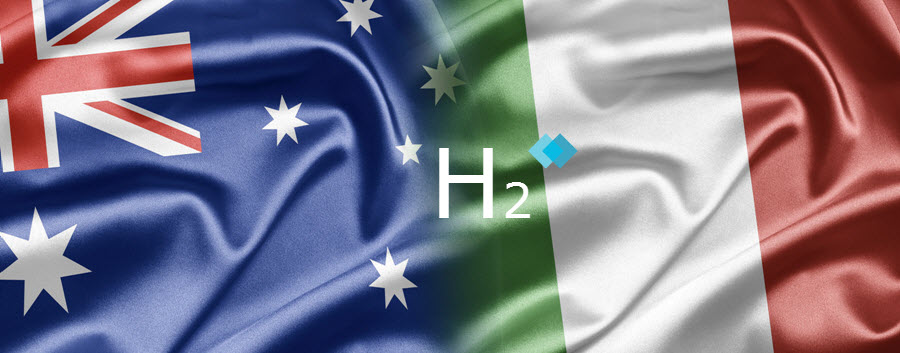
Researchers from the ANU Energy Change Institute (ECI) and the Italian National Agency for New Technologies, Energy and Sustainable Economic Development (ENEA) have held their first joint workshop which explored their expertise in hydrogen and renewable fuels, and created foundations for future collaborations.
Held over two days and with the support of Australia’s Department of Foreign Affairs and Trade and the Embassy of Italy in Canberra, the Zoom meetings followed a Memorandum of Understanding ECI and ENEA signed in late 2019.
Anna Maria Fioretti, Scientific Attaché at the Italian Embassy, said both countries were at the forefront of renewable energy and developing their respective hydrogen strategies.
The countries were ideal partners as they are already cooperating in renewable energy, including the Bungala solar farm in South Australia, and on the Snowy Hydro scheme in NSW, she said.
Ms Fioretti added that Italy was committed to be net zero by 2050, and outlined some of the country’s priorities during its presidency of the G20, such as inclusion and universal access to energy, and addressing energy poverty.
ECI Director, Professor Ken Baldwin, said he and his colleagues were delighted that more than two dozen researchers from both countries were able to meet remotely to discuss current projects, and potential future collaborations in areas of mutual interest.
“Both Australia and Italy have a strong emphasis on hydrogen as an energy vector that could play a significant role in our respective future energy needs,” he said
“For example, Australia has a national hydrogen strategy in which the ECI played a part, while Italy recently released its draft strategy.
“Both ECI and ENEA have agreed to work on a new event in 2021 that we hope will be expanded to cover more research areas, as well as government departments and industries from both countries.”
The workshop featured opening remarks read on behalf of the Australian Ambassador for the Environment, Jamie Isbister, who said he welcomed cooperation between the ECI and ENEA, calling it a timely way to share research from both countries.
Giorgio Graditi, ENEA’s Head of the Department of Energy Technologies and Renewable Energy Sources, said his organization, which began in 1952 with a focus on nuclear research, has grown to around 500 members who specialise in various energy and new technology fields.
He said ENEA was very interested in strengthening cooperation with the ANU along the hydrogen value chain.
The technical workshop covered several solar hydrogen production and renewable fuels research projects in detail.
These included ANU projects converting solar energy into hydrogen, perovskite photovoltaics, renewable fuels for aerospace, and the $10m Grand Challenge: Zero-Carbon Energy for the Asia-Pacific.
ENEA projects included biohydrogen research and green hydrogen from renewable feedstocks and concentrated solar thermal energy.
ENEA will in early 2021 start construction of a hydrogen demonstration facility at its Casaccia research centre, which will produce hydrogen for industry and research, test an existing gas pipeline network, and use it to power buses for tours of the site outside Rome.
Canberra’s local utility, Evo Energy, has built a hydrogen testing facility bringing together ANU researchers and industry practitioners exploring emerging hydrogen technologies. ActewAGL, a local partnership, is completing a refueling station in Canberra’s southeast industrial suburb of Fyshwick to create renewable fuel for the ACT Government’s fleet of 20 hydrogen fuel cell vehicles.
Dr Viviana Cigolotti, workshop co-convenor from ENEA’sDepartment of Energy Technologies and Renewable Sources, said ENEA was very happy with the discussions, and looked forward to working together to share different views around energy policies and strategies.
Event co-convenor, Dr Igor Skryabin, the ECI’s Research and Business Development Manager, said further talks would help determine future links between academia and industry, as well as how to inform policies involving Australia and the European Union.
This story was originally published by The Australian National University on 18 December 2020
Read the most up to date Fuel Cell and Hydrogen Industry news at FuelCellsWorks




